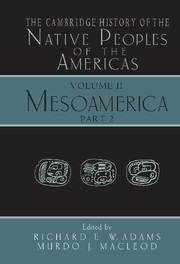Book contents
- Frontmatter
- 12 Mesoamerica Since the Spanish Invasion: an Overview
- 13 Legacies of Resistance, Adaptation, and Tenacity: History of the Native Peoples of Northwest Mexico
- 14 The Native Peoples of Northeastern Mexico
- 15 The Indigenous Peoples of Western Mexico from the Spanish Invasion to the Present
- 16 Native Peoples of Colonial Central Mexico
- 17 Native Peoples of Central Mexico Since Independence
- 18 Native Peoples of the Gulf Coast from the Colonial Period to The Present
- 19 The Indigenous Population of Oaxaca from the Sixteenth Century to the Present
- 20 The Lowland Mayas, from the Conquest to the Present
- 21 The Highland Maya
- Index to Part 2
- Map 12.1: A general map of Mesoamerica, showing major ancient, colonial, and modern population centers"
- References
20 - The Lowland Mayas, from the Conquest to the Present
Published online by Cambridge University Press: 28 March 2008
- Frontmatter
- 12 Mesoamerica Since the Spanish Invasion: an Overview
- 13 Legacies of Resistance, Adaptation, and Tenacity: History of the Native Peoples of Northwest Mexico
- 14 The Native Peoples of Northeastern Mexico
- 15 The Indigenous Peoples of Western Mexico from the Spanish Invasion to the Present
- 16 Native Peoples of Colonial Central Mexico
- 17 Native Peoples of Central Mexico Since Independence
- 18 Native Peoples of the Gulf Coast from the Colonial Period to The Present
- 19 The Indigenous Population of Oaxaca from the Sixteenth Century to the Present
- 20 The Lowland Mayas, from the Conquest to the Present
- 21 The Highland Maya
- Index to Part 2
- Map 12.1: A general map of Mesoamerica, showing major ancient, colonial, and modern population centers"
- References
Summary
At the time of the Spanish conquest, lowland Maya-speaking peoples occupied a vast region that today encompasses the three Mexican states of the Yucatan Peninsula (Yucatan, Campeche, and Quintana Roo), eastern Tabasco, the lowland tropical forests of eastern Chiapas, the department of Peten, Guatemala, and parts of Alta Verapaz, Guatemala, and northwestern Honduras. At the time of first Spanish contact the native peoples of this territory, which extends more than 650 kilometers north-south and about 450 kilometers east-west at its widest point, spoke primarily variants of Yucatecan Maya. A smaller number of speakers of several related Cholan Maya languages occupied the southern and western portions of the lowlands.
The Maya lowlands demonstrated less linguistic diversity than other regions of Mesoamerica, but historical and geographic factors fostered the development of distinctive regional traditions in pre-conquest times. These traditions found their expression in localized and often opposed political territories of varying degrees of centralization, in a variety of regional economies and interregional trade relationships, and, of course, in localized cultural differences. Such differences required the European conquerors and their colonial and national period descendants to impose alternative methods in the conquest and administration of the subregions of the lowlands, and the Mayas in turn responded in various ways to these challenges to their autonomy. The lowland Maya world of today is thus a product of complex cultural and historical forces.
Keywords
- Type
- Chapter
- Information
- The Cambridge History of the Native Peoples of the Americas , pp. 346 - 391Publisher: Cambridge University PressPrint publication year: 2000
References
- 4
- Cited by



